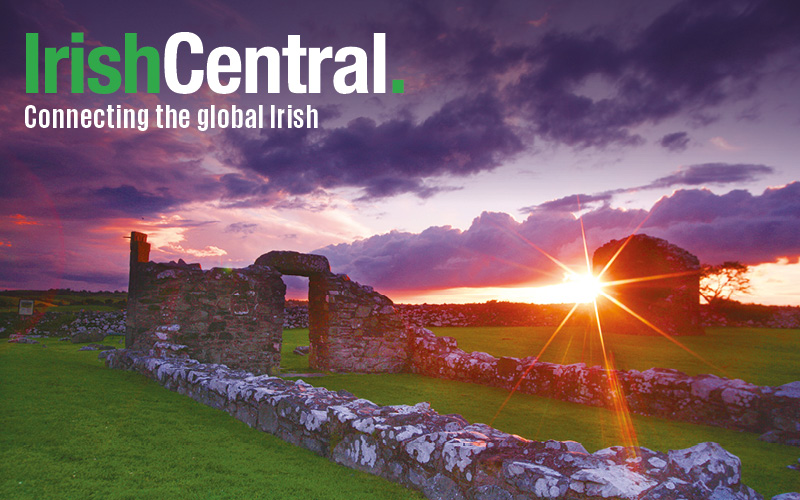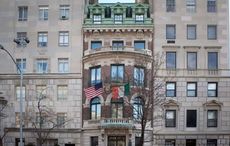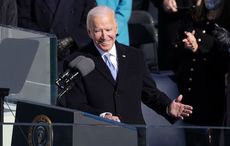“Ná habair é, déan é” (Don’t say it, do it) was the main message spread by Dr. Feargal Mac Ionnrachtaigh at the Tenth Annual Barra Ó Donnabháin lecture on March 7.
Dr. Mac Ionnrachtaigh delivered his lecture, “From Cumann Chluain Árd to An Lá Dearg: Building Gaelic Communities from the Bottom Up in the North of Ireland,” as a conclusion to the Lá Gaeilge (Irish language day) organized by Glucksman Ireland House NYU.
The motto, made popular by Irish-language activists in Belfast during the bottom-up community language revival in the north of Ireland, was used to encourage speakers and learners to organize community events, classes and social occasions and encourage the use of Irish outside of the classroom. The lecture gave encouragement for efforts outside of Ireland, citing the Irish language as a key unifying factor for the Irish diaspora and one that was promoting a culture of participation.
Dr. Mac Ionnrachtaigh, author of “Language, Resistance and Revival: Republican Prisoners and the Irish Language in the North of Ireland”, spoke to IrishCentral of the way in which Irish speakers in New York, in particular, had already promoted the language in Ireland through the rally Lá Dearg (Red Day) held last year.
The rally was held following the language rights rallies in Dublin and Belfast and coverage of the event in New York was shared through social media in Ireland after a report on Irish language TV network, TG4. For many in Ireland it was encouraging to see Irish spoken with American accents and others supporting them in their quest for equal language rights.
Irish people are at an advantage in that they begin to learn Irish in school, Mac Ionnrachtaigh continued to say, with some even having the opportunity to attend a Gaelscoil. This is a luxury not afforded to lovers of the language outside of Ireland and the extra effort it takes to learn the language is something that is appreciated by speakers in Ireland.
This does not change the fact that we are all part of the one language community, he added, and if we can encourage Irish in this way in America, it can only strengthen the status of the language in Ireland.
The Ó Donnabháin lecture focused on the research of Dr. Mac Ionnrachtaigh, his PhD thesis, and subsequent book on the language revival in Belfast - a story that had never been properly told before. As a member of the community and an ex-pupil of Bunscoil Phobal Feirste and Meánscoil Feirste (Irish language schools in west Belfast), he felt in a special position to tell this story and to share the experiences of the activists.
The grass-roots campaign for Irish in Belfast came through a desire to use the struggle for Irish as a means of revenge and as a decolonizing project. The question that struck many was “why would they try to destroy our language if it wasn’t important” and, by promoting its usage, the language came to act as an emancipatory power in Northern Ireland. The community worked to take the Irish language out of politics and break the alienation with the language by introducing it to working class areas. The efforts of the community fostered and encouraged social change and broke down the culture of acceptance.
Since the signing of the Good Friday Agreement, these calls for change have become harder, as they are now seen as calls against peace. Despite this, the Irish language rights movement in Northern Ireland has developed the best ways to campaign, proving change can happen from the ground up.
Taking from this, Mac Ionnrachtaigh spoke of what can be learned from this revival in the States, techniques which are already being used by the Irish-speaking community in the U.S. As in Belfast, the language is growing at a local level with classes and events.
Returning to his phrase, “Ná habair é, déan é” Mac Ionnrachtaigh said that there are times when you just have to decide to organize something yourself, the most important thing is to bring people together. Irish people love to meet together and once you have one event, the next will come from that. He said that he has already seen this kind of activism in the States and any kind of interaction with the language can make a difference, from attending classes to using it online. Mac Ionnrachtaigh believes that the positive culture built around the Irish language in the States can only have good outcomes for the language’s future.
A further New York Lá Dearg will be held on Sunday March 15 with a march at sunset beginning Rocky Sullivan’s, Brooklyn.
Do you think Irish speakers outside of Ireland can make a difference? Leave your thoughts in the comments section below.




Comments